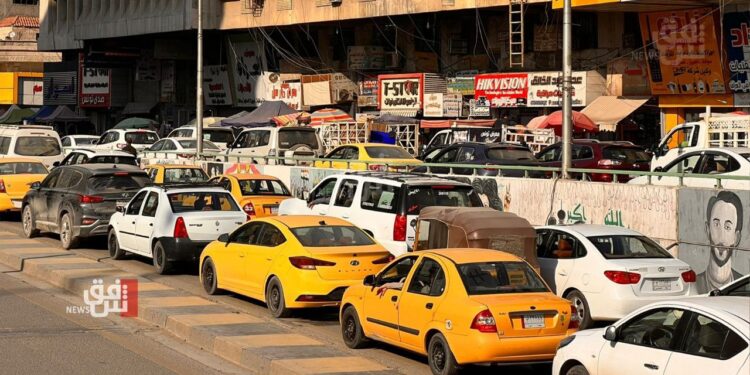Shafaq News – Traffic congestion in Baghdad has reached alarming levels, bringing parts of the city to a near standstill. Journeys that once took 20-30 minutes now stretch to as long as four hours, leaving residents frustrated by the loss of time and resources.
Safa Al-Mashhadani, a member of the Baghdad Provincial Council, has identified the main factors contributing to the crisis and urged Prime Minister Mohammed Shia Al-Sudani and Interior Minister Abdul Amir Al-Shammari to consider tunnel construction as a viable solution.
Speaking to Shafaq News, Al-Mashhadani explained that incomplete road projects—such as those connecting Mosul to Baghdad, Fallujah to Abu Ghraib, and Diyala to Baghdad—are worsening congestion. Many of these projects have stalled due to sluggish progress by construction firms, with some remaining inactive for up to four years. Additionally, design flaws in several bridges have further compounded the traffic bottlenecks.
Given the growing number of vehicles on Baghdad’s roads, Al-Mashhadani emphasized the urgent need for tunnels to ease congestion and called for their prioritization in upcoming development plans. He also urged PM Al-Sudani to restart long-delayed projects and encouraged Minister Al-Shammari to enhance traffic management strategies.
Beyond delays, the traffic crisis is disrupting essential services. Emergency responders struggle to transport patients to hospitals on time, and prolonged commutes are impacting employee productivity. Residents have called for comprehensive measures to address both infrastructure shortcomings and the sharp rise in vehicle numbers, which are straining the city’s roads and economy.
Fadel Al-Gharawi, head of the Strategic Center for Human Rights in Iraq, underscored the economic consequences of the crisis, estimating that traffic congestion costs Iraq between $1 billion and $2 billion annually. Supply chain disruptions, reduced workforce efficiency, and increased personal expenses—rising by as much as 40%—are among the financial burdens caused by gridlock. Al-Gharawi also highlighted the environmental toll, pointing to increased fuel consumption, pollution, and respiratory health risks. According to the World Bank, traffic-related costs account for roughly 1.5% of Iraq’s GDP.
While the government has launched initiatives such as bridge and tunnel projects to address congestion, Al-Gharawi stressed the need for a more comprehensive approach. He advocated for the expansion of public transportation networks, road widening, and the adoption of smart traffic management technologies to mitigate the economic and environmental impact of Baghdad’s ongoing traffic crisis.























































